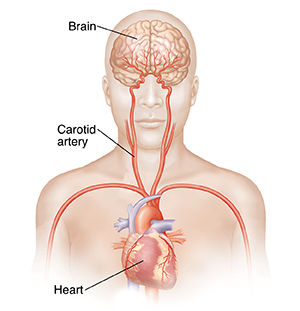Causes of Syncope
Causes of Syncope
Syncope (fainting) has many causes. Sometimes it is not serious. In other cases, syncope is a sign of a heart problem. But treatment can help
When syncope is not serious
Your healthcare provider may call your problem vasovagal syncope, reflex syncope, or orthostatic hypotension. These types of syncope are generally not serious. They can be caused by:
Strong feelings, such as anxiety or fear. A nerve signal may briefly change your heart rate and lower your blood pressure too much.
Standing for too long. Standing may cause blood to pool in your legs. When this happens, your brain may not receive all the blood it needs.
Standing up too quickly. Your blood pressure may not adjust fast enough to changes in posture and may drop too low. Certain medicines can also cause this problem. Examples of medicines that can cause a drop in blood pressure include diuretics, blood pressure medicines, and medicines for chest pain. Your pharmacist or healthcare provider can discuss these with you.
Reaction to normal body functions. When you go to the bathroom, have gastrointestinal discomfort, nausea, or pain, your heart may have a natural reflex to slow down and lower blood pressure. This can result in syncope. This may also follow exercise, eating, laughter, weight lifting, or playing musical instruments like the trumpet or trombone.
When heart trouble causes syncope
A heart problem can decrease the amount of oxygen-rich blood that reaches the brain. Heart trouble can be serious and even life threatening if not treated:
A slow heart rate. Electrical signals tell the chambers of the heart when to pump. But the signals may be slowed or blocked (heart block) as they travel on the heart’s electrical pathways. This can be caused by aging, scarred heart tissue, or damage from heart disease. When the heart rate slows, not enough blood is pumped.
A fast heart rate. Certain problems can make the heart race. For instance, after a heart attack, also known as acute myocardial infarction, or AMI, abnormal electrical signals may be created. These signals can make the heart suddenly beat very fast. The heart pumps before the chambers can fill with blood. So less blood reaches the brain and other parts of the body. Illegal drugs, certain medicines, heart disease, or an inherited condition can also cause this.
A heart valve problem. Blood travels through the chambers of the heart as it is pumped. Heart valves open and close to help move blood in the right direction. But a valve may not open or close fully, if it’s hardened or scarred. As a result, less blood is pumped through the heart to the brain and body. Most often, syncope occurs when a person's aortic valve is critically narrowed and he or she participates in a strenuous activity.
A heart muscle problem. Some people develop a thickened heart muscle that blocks blood flow out of the heart to the body. This is called hypertrophic cardiomyopathy. Being dehydrated and having hypertrophic cardiomyopathy can increase the risk for syncope.
Whatever the cause of syncope, it is important to be evaluated by your healthcare provider. You may need to be seen by a cardiologist, neurologist, or an ear, nose, and throat specialist. Do not drive, operate heavy machinery, or participate in activities in which you would be at risk for falls and injury if you have syncope and have not been evaluated.
Updated:
March 21, 2017
Sources:
Causes of syncope in children and adolescents, Up To Date, Evaluation of Syncope in the Emergency Department. Lemonick, D. American Journal of Clinical Medicine. 2010, is. 7, ed. 1, pp. 11-19., Pathogenesis and etiology of syncope, Up To Date, Walsh, K., Syncope: Diagnosis and Management, Current Problems in Cardiology (2015); 40(2); 51-86
Reviewed By:
Image reviewed by StayWell medical illustration team.,Kang, Steven, MD,Snyder, Mandy, APRN
